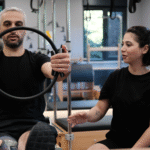I’ve always had big goals for myself—whether it’s getting healthier, becoming more focused, or just improving my mindset. But I used to get frustrated because real change never seemed to happen as quickly as I wanted. That’s when I realized: it’s not about overnight transformations, it’s about the little steps you take every day. And one tool that’s helped me stay on track is a habit tracker.
For me, a habit tracker can be as simple as a notebook, a chart on my wall, or even an app on my phone. Each day, I check off the habits I’ve completed. It might sound small, but that tiny checkmark gives me a sense of progress. It reminds me that I’m moving forward, and it keeps me motivated to keep going.
What I’ve noticed is that tracking my habits gives me clarity. Instead of guessing how consistent I’ve been, I can actually see the patterns—what’s working well and where I tend to slip. It’s not about perfection; it’s about building consistency. And even if I miss a day, I don’t beat myself up. I just pick back up the next day, because every small win is a step closer to the bigger picture.
Over time, those little checkmarks add up. And honestly, that’s how I’ve been able to turn small daily actions into real, lasting change.
105 Daily Habit Tracker Ideas
![]()
1–15: Habits for Physical Health
Taking care of your body helps you feel stronger, more energetic, and ready to face each day. When you make health a daily habit, you create a foundation for everything else in life.
-
Drink eight glasses of water
-
Eat five servings of fruits or vegetables
-
Take vitamins or supplements
-
Get at least seven hours of sleep
-
Walk 10,000 steps
-
Stretch for ten minutes
-
Limit junk food
-
Go to bed before 10 p.m.
-
Eat a home-cooked meal
-
Limit caffeine intake
-
Prepare your meals for the next day
-
Avoid eating after a set time
-
Cook something healthy
-
Take time to chew food slowly
-
Do a full-body check-in with yourself
Read also: 56 Fun Digital Detox Ideas for Kids
16–30: Habits for Mental Wellness
Your mind is just as important as your body. These habits help you slow down, check in with yourself, and build emotional strength.
-
Journal for ten minutes
-
Write down three things you’re grateful for
-
Limit screen time
-
Spend time in silence
-
Meditate or do breathing exercises
-
Say something kind to yourself
-
Avoid negative self-talk
-
Listen to calming music
-
Stay off social media for an hour
-
Declutter a small space
-
Sit outside in nature
-
Say no to something that drains you
-
Limit news consumption
-
Practice forgiveness
-
Repeat a positive affirmation
Read also: 105 Affirmations to Overcome Your Fear
31–45: Habits for Productivity
These habits help you stay focused and get more done. They give your day structure and help you make steady progress toward your long-term goals.
-
Write a daily to-do list
-
Set three main goals for the day
-
Complete your hardest task first
-
Limit multitasking
-
Clear your workspace
-
Plan your day in time blocks
-
Review your goals
-
Limit distractions while working
-
End your day with a work summary
-
Check your calendar
-
Organize your inbox
-
Take short breaks between tasks
-
Read or listen to a productivity tip
-
Track how you spent your time
-
Work without your phone nearby
Read also: 13 Cozy Fall Habits to Enhance Your Life
46–60: Habits for Personal Growth
If you want to grow as a person, these habits can help. They push you to learn, reflect, and become more aware of yourself and the world around you.
-
Read ten pages of a book
-
Watch an educational video
-
Practice a new language
-
Learn a new word
-
Reflect on one life lesson
-
Study a skill for twenty minutes
-
Write about your progress
-
Listen to a motivational podcast
-
Write down one new thing you learned
-
Write about your strengths
-
Read a biography or memoir
-
List one way you handled a challenge
-
Practice active listening
-
Spend five minutes reviewing your week
-
Ask for feedback on something
61–75: Habits for Relationships
Good relationships don’t just happen. They grow through daily care. These habits help you build stronger bonds with others and bring more kindness into your day.
-
Send a thank-you message
-
Ask someone how they are and really listen
-
Tell someone you appreciate them
-
Spend quality time with a loved one
-
Avoid gossip
-
Share a positive story
-
Say something kind to a stranger
-
Make a phone call to someone close
-
Offer help to someone
-
Compliment someone
-
Write a note or letter
-
Plan a family activity
-
Resolve a small misunderstanding
-
Limit complaints in conversations
-
Be fully present during meals
76–90: Habits for Finances
Money habits shape your future. Tracking daily actions can help you spend wisely, save more, and feel more in control of your financial life.
-
Track your spending
-
Avoid impulse buying
-
Bring lunch from home
-
Transfer money to savings
-
Avoid online shopping
-
Use cash instead of cards
-
Check your bank balance
-
Review your budget
-
Pay a bill or track due dates
-
Look for free entertainment
-
Skip one unnecessary purchase
-
Read one tip on managing money
-
Save loose change
-
Plan future expenses
-
Cook at home instead of ordering
91–105: Habits for Spiritual or Purposeful Living
Many people feel more grounded when they stay connected to their values or spiritual life. These habits help you find meaning and peace in your day.
-
Pray or reflect quietly
-
Read a sacred or spiritual text
-
Write about your purpose
-
Practice gratitude intentionally
-
Light a candle and sit in peace
-
Ask yourself what matters most
-
Give without expecting something back
-
Spend time alone in nature
-
Focus on living in the moment
-
Do something kind for a stranger
-
Let go of something that hurt you
-
Think about how you can serve others
-
Listen to your heart, not just your mind
-
Reflect on the bigger picture of your life
-
Ask yourself what brings you true joy
You don’t have to use all 105 of these ideas. In fact, trying to track too many habits at once can leave you feeling burned out. Start with just five to ten habits that fit your life right now. Choose the ones that help you move closer to who you want to become. Keep your tracker somewhere you can see it each day — on your wall, in your notebook, or on your phone.
As time goes on, you can add more habits or remove the ones that no longer serve you. The key is to stay consistent, not perfect. Even on tough days, checking off just one habit can remind you that you’re still making progress.
Habit tracking helps you build discipline, focus, and self-awareness. It’s a quiet way to take control of your life, one small choice at a time. And every checkmark is proof that you showed up for yourself.
Save the pin for later


